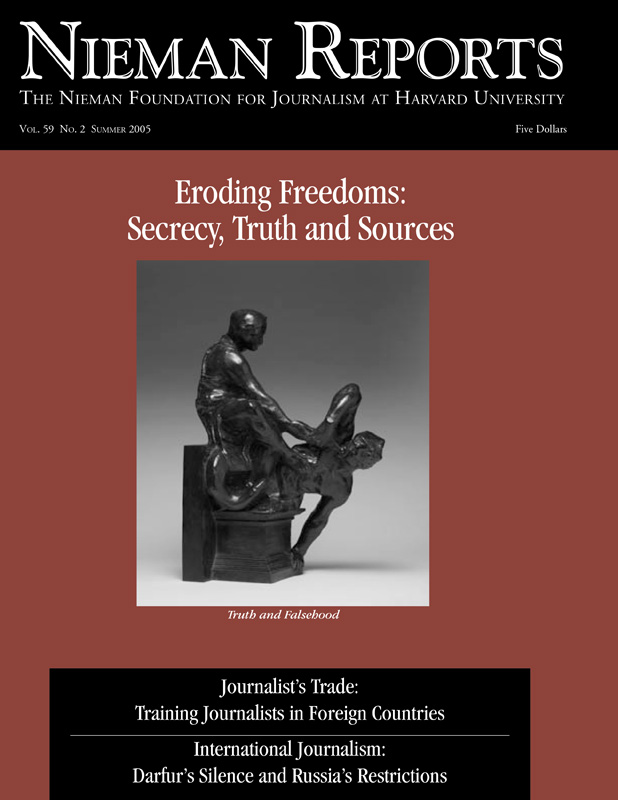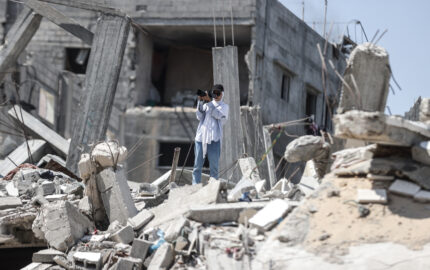Rarely do photographs accompany words on the op-ed page of The New York Times. But earlier this year Times columnist Nicholas Kristof connected four gruesome images of the genocide taking place in Darfur with his ongoing reporting about the death and destruction there. In an e-mail exchange with Nieman Reports, he talked about why he decided to use these images and shared his thoughts on why what is happening in Darfur doesn’t receive more attention from Western journalists. Kristof observed that “Particularly with issues like Darfur that have an element of the dutiful in them—horrible things are happening in a country that the reader is never going to visit—the tendency is for the reader to skip over them. No reader is going to bounce over a wrenching photo, though, particularly one in a surprising place like the op-ed page.”
Ellen Knickmeyer, who reported from West Africa for The Associated Press from 1999 until 2005 and is now The Washington Post’s Baghdad bureau chief, explains that the Western news media’s inattention to the genocide in Darfur fits a pattern of neglect that is increasingly common with stories out of Africa. When the Darfur killing intensified in February 2003, Iraq was claiming the international news spotlight and consuming newsroom resources. Knickmeyer points out that by then “news agencies and most newspapers in the United States now were becoming capable of looking at major events in Africa, acknowledging they were news, and deciding not to spare the resources to cover them.”
In an article originally published in The Boston Globe, Masha Gessen, deputy editor of Bolshoy Gorod, an independent magazine based in Moscow, describes some of the very difficult decisions journalists confront in Vladimir Putin’s Russia. In writing about her own choices, Gessen acknowledges that “If I lose my job because I write or assign a story that gets the magazine shut down, I may never work in this country again.” In a follow-up article that accompanies her globe story, Gessen details the editorial decision-making process her magazine went through with a story involving two verdicts against members of a leading political opposition party.
Alex Lupis, who is the senior program coordinator for Europe and Central Asia at the Committee to Protect Journalists, provides an overview of the increasingly repressive measures the Putin government has brought against journalists in Russia. Now, six and a half years after Putin became president, Lupis writes that “the Kremlin’s apparatchiks continue to rely on a multipronged campaign of lawsuits, bureaucratic obstruction, crude intimidation, and hostile corporate takeovers to silence the president’s few remaining media critics.”
Ellen Knickmeyer, who reported from West Africa for The Associated Press from 1999 until 2005 and is now The Washington Post’s Baghdad bureau chief, explains that the Western news media’s inattention to the genocide in Darfur fits a pattern of neglect that is increasingly common with stories out of Africa. When the Darfur killing intensified in February 2003, Iraq was claiming the international news spotlight and consuming newsroom resources. Knickmeyer points out that by then “news agencies and most newspapers in the United States now were becoming capable of looking at major events in Africa, acknowledging they were news, and deciding not to spare the resources to cover them.”
In an article originally published in The Boston Globe, Masha Gessen, deputy editor of Bolshoy Gorod, an independent magazine based in Moscow, describes some of the very difficult decisions journalists confront in Vladimir Putin’s Russia. In writing about her own choices, Gessen acknowledges that “If I lose my job because I write or assign a story that gets the magazine shut down, I may never work in this country again.” In a follow-up article that accompanies her globe story, Gessen details the editorial decision-making process her magazine went through with a story involving two verdicts against members of a leading political opposition party.
Alex Lupis, who is the senior program coordinator for Europe and Central Asia at the Committee to Protect Journalists, provides an overview of the increasingly repressive measures the Putin government has brought against journalists in Russia. Now, six and a half years after Putin became president, Lupis writes that “the Kremlin’s apparatchiks continue to rely on a multipronged campaign of lawsuits, bureaucratic obstruction, crude intimidation, and hostile corporate takeovers to silence the president’s few remaining media critics.”



